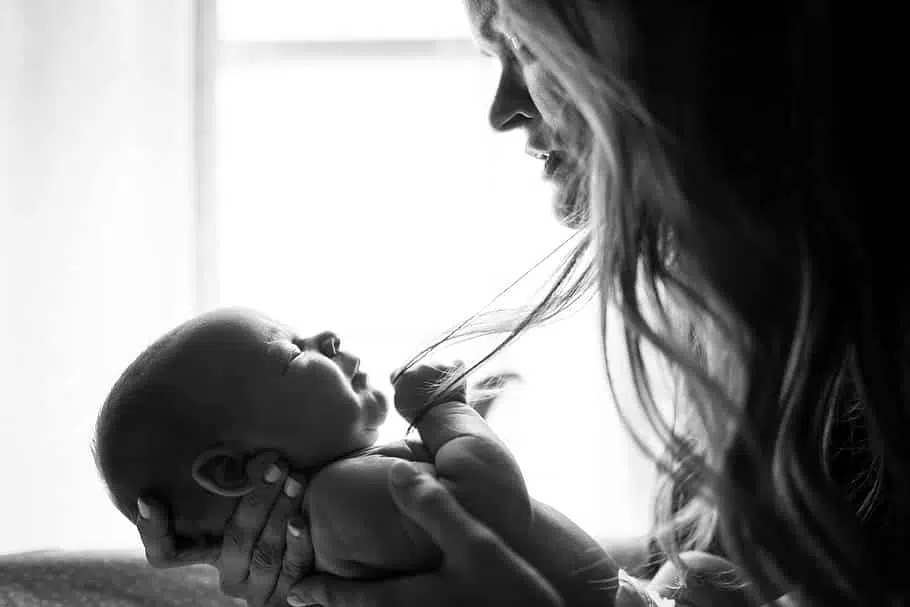For most women, seeing two lines or the word “pregnant” on a tiny stick elicits unimaginable joy. But this is not the case for everyone. A surprise pregnancy sets the mind spinning, the heart racing, and the nerves unraveling.
Questions fill the new mom’s mind: What will I do? How will I afford this? Will my baby’s father be there to help? What about school? What do I know about being a mother?
Even for someone intending to get pregnant, it can be terrifying to have a tiny life in your hands. But for someone who did not intend a pregnancy, it can be even more terrifying.

Many of us have known someone who found herself unintentionally pregnant. The story is common, but in today’s climate, where women are encouraged to shout their abortions, where the media attempts to normalize the act, and where movie stars say it was the “best choice” they ever made, how do you teach a scared and pregnant mother about the sanctity of the life she’s carrying?
When talking to a friend, a child, a child’s friend, or a family member who is considering abortion, first and foremost, put yourself in her shoes. Approach her with love and compassion, not just for the baby, but for her. Then begin a dialog that comes from your heart, that teaches the facts, and that leaves judgmental words at the door.
1. Begin by Asking What You Can Do to Help
Oftentimes a pregnant mother doesn’t even know what she needs. She’s so overwhelmed with fear of the unknown that she can’t comprehend what this new life entails. Talk about what she fears the most. Don’t belittle her fears, but try to help her work through them.
Depending on her age, these fears will differ. She may be a teen not only concerned that college plans are altered now, but she may think she might not even graduate from high school. She may be concerned that she will have no place to live. She may worry about her lack of parenting skills. Listen to her fears and help her conquer them one by one. All these fears at once can seem unsurmountable, but when you help her chip away at each, she’ll begin to feel more confident.
2. Use “He” or “She” When Talking about Her Baby
Whenever you talk about her baby, use the pronouns “he” or “she.” This personalizes the baby and helps her understand that the baby is a human being. Calling the baby “it” denies his humanity.
3. Pull out Your Phone or Computer
Grab a device and get on the Internet! Show this new mom what her baby looks like at this stage. Talk about her growing baby.

The Carnegie Stages of Human Development website offers images of preborn babies at every stage. Explain that she created a new human being the moment the sperm fertilized her egg. Describe how her new baby looks and what he can do at each stage. Make it clear that the baby already has his own DNA and that he is a unique person who is depending on her.
More resources:
4. Show Sonogram Images
While you’re marveling at the wonders of a preborn baby online, pull up some sonogram pictures. Point out the baby’s tiny feet and hands. You can even view 4D sonogram images that show the baby moving, sucking his thumb, or smiling. Seeing these images will help the mother feel closer to her baby and will help her realize that he is a tiny human being.
5. Discuss Adoption
If the mother does not want to keep her baby, tell her there are countless couples who desperately want a baby and who would give him a good home. Explain that there is no shame in giving a baby to a loving family and that adoption is a very loving option and an immense gift. Explain that there are even open adoptions where she can get regular updates about her baby. If she wants to explore this route, help her find resources and counseling.
6. Mention Preborn Babies from the Bible
If your friend or family member is religious, you can mention Bible verses that show the humanity of the preborn baby. Some great ones include:
- The word of the Lord came to me: Before I formed you in the womb I knew you, before you were born I dedicated you, a prophet to the nations I appointed you. – Jeremiah 1:4-5
- You formed my inmost being; you knit me in my mother’s womb. – Psalm 139:13
- For at the moment the sound of your greeting reached my ears, the infant in my womb leaped for joy. – Luke 1:44
- Certainly [children] are a gift from the Lord, the fruit of the womb, a reward. – Psalm 127:3
These verses show the humanity of the preborn baby and how this baby is incredibly loved by God from the instant of creation.
7. Address the Reality of Abortion
Depending on how comfortable you feel discussing the gruesomeness of abortion, you can explain what an abortion entails or even show pictures. This, of course, depends on your relationship with the woman and her sensitivity. The following video explains a first-trimester vacuum abortion procedure:
Warning: graphic content
8. Discuss the Regret Felt by Mothers Who Abort Their Babies
Despite a new study that claims that women feel relief five years after having an abortion, this is not what pro-lifers working in the field see. They see an increase in the number of church groups and other post-abortive ministries. They see an increase in the number of people seeking counseling after an abortion. And they see women seeking counseling 10 or even 20 years after an abortion. Regret can happen any time, and women need help healing.
Ministries like Rachel’s Vineyard exist to help post-abortive women (and men) find peace after an abortion. With 1,000 retreats each year in 49 states and 70 countries for just this organization alone, clearly there is a need for healing.
9. Explain that the Phrase “My Body, My Choice” Is a Fallacy
Discuss the fact that, while the preborn child resides within his mother’s body, he is not part of her body. He has his own body, his own DNA, his own personality, and he is growing every day.
10. Focus on the Positive
Discuss the joy she will know when she cradles her baby’s little body and looks into his eyes. While she may feel stressed now and consider him a “mistake,” she will look upon her little newborn with awe and experience the purest form of love imaginable. Many websites have inspirational stories of women who chose life. These will help the scared mother understand that she is not alone and that she can turn this scary situation into something wonderful.
11. Build Her Up!
Show Her She Can Learn the Skills to Be a Good Mom
Do some research before you talk to her. If she’s scared of being alone, show her she’s not alone. If she’s scared she will never finish school, give her examples of people who attended high school and college with a baby. If she’s concerned about finances, explain that there are places to help. If she’s scared her boyfriend will leave, show her how to rely on herself and others. Though not all parents or family members are receptive to an out-of-wedlock birth, many are. Encourage her to reach out for help to family and friends. If she is unable to get help at home, help her find resources that will provide the assistance she needs (see below).
12. Give Her Concrete Help
Explain that pro-aborts like to say that pro-lifers only care about the baby and not the mother, but that this is far from the truth. Explore the list below with her and explain that there are many, many organizations out there that want to help. Give her these examples, and then assist her in finding a pregnancy help center in her area.
Crisis Pregnancy Centers
Crisis pregnancy centers are in every state. You can find a list through Focus on the Family.
Heartbeat International
Heartbeat International serves 1.5 million clients each year.
This organization gives free services and helps mothers throughout the country. Its site even has stories of mothers who chose life for their babies. These inspirational stories can help women realize that they are very capable of being good moms. You can find a location near you with this handy tool.
Care Net
Care Net is an organization dedicated to helping mothers choose life.
It has 1,100 affiliates throughout North America and offers assistance such as parenting programs and materials for women who are need. Last year, Care Net provided over $62 million in free services to its clients.
Lifecall
Lifecall is an organization aimed at helping women choose life for their babies.
This organization provides counseling, information, and even shelter to women so they can choose life for their babies.
Saint Gianna’s Maternity Home
Saint Gianna’s Maternity Home in Minto, North Dakota, provides a loving home environment for mothers and their babies.
This amazing family-oriented maternity home helps women understand the beauty of being a mother. Women can stay there while they further their education, learn parenting skills, and learn the life skills necessary for living on their own someday.
National Maternity Housing Coalition
The National Maternity Housing Coalition helps women find the resources they need.
Its mission is to “inspire excellence among maternity housing providers and articulate a collective voice to advance the culture of life and the Gospel of Jesus Christ. This will be done by providing training and tools, facilitating an exchange of knowledge and experience, and fostering fellowship among members.” You can find a maternity home close to you by visiting Heartbeat International’s worldwide directory.

Fear of the unknown can be debilitating, but it doesn’t have to be. Women and young girls can make wonderful lives for themselves and their babies, even without a husband. Take Ally, for instance.
Ally
Ally was my best friend in high school. We didn’t meet until our senior year when she moved from another state to mine. She sat behind me in homeroom, and as we filled out our emergency cards that first day of school, she looked at me quizzically and said: “There isn’t anywhere on here to check if you’re pregnant.”
I asked if she was pregnant, and she said yes; she was three months along. Having been around pro-life people nearly my entire life, I responded, “That’s cool. What are you going to do?” She happily said she was going to keep the baby, that she had just moved to the state to live with her mom and stepdad, and that they were very supportive. The father was not in the picture, and she was okay with that.
I told her I thought it was awesome. Our years-long bond began forming tightly that day.
Ally had the baby in the spring of our senior year, so she finished high school from home and graduated with our class. Her infant daughter was there to watch her walk across the stage.
Ally and I became best friends, and she embraced motherhood like a champ. It wasn’t easy, but she loved every moment of it. And she was a great mother—one of the best mothers I know. I believe I’m a better mother today because of her example.
Final Thoughts
I asked Ally once if she had ever considered abortion. She shook her head and said she could never do that because she knew she was carrying a baby. She understood that her baby was a human being from the first moment of creation.
This is the education we must impart on women—young and old—today. This is what we must teach society. Babies are not something to fear; they are people to love and cherish. They are not trash to dispose of; they are gifts to embrace.
Only when we help people understand this, and only when we lovingly support scared mothers, will we finally help people see the true horrors of abortion. And only then will we be a country free of this scourge.
Do you have any tips for having a fruitful conversation with a mother about her unintended pregnancy? Comment below!
Related Content
Susan Ciancio has a BA in psychology and a BA in sociology from the University of Notre Dame, with an MA in liberal studies from Indiana University. Since 2003, she has worked as a professional editor and writer, editing both fiction and nonfiction books, magazine articles, blogs, educational lessons, professional materials, and website content. Fourteen of those years have been in the pro-life sector. Currently Susan writes weekly for HLI, edits for American Life League, and is the editor of its Celebrate Life Magazine. She also serves as executive editor for the Culture of Life Studies Program, an educational nonprofit program for k-12 students.













Women that are faced with unexpected, scary pregnancies are not just teen moms (which thankfully are in decline). They may be that pious mom with 4 kids at Mass who is tearfully praying that she’s not pregnant again. I was that mom… pregnant with #5 less than 3 months after #4’s also unexpected arrival. My ex husband kicked a hole in our daughter’s door the night he found out… waking her up. He barely talked about the baby and texted horrible expletatives about our kids when I was admitted to the hospital for an emergency hernia repair while 6 months pregnant. He didn’t even pick me up the next day from the hospital (I had to call a co worker). I have ALWAYS been prolife. I love theology of the body and I strongly believe in the sanctity of life. But even this super prolifer I’m ashamed to admit, had the awful thought of abortion flash across my mind… it may not have lasted more than a moment, but God forgive me, it occurred. Crisis pregnancy is not just for 16 year olds. I remember wishing I could reach out to a community for support, but none seemed appropriate for a married mom, high income, who was just terrified of her husband. We need to acknowledge and support ALL TYPES of unexpected pregnancy. BTW, #5 is my Mama’s boy who adores me and can make me smile and be a better mother even when I’m at the end of my rope. He’s my special blessing. Thank God for him.
Thank you for this wonderful article. I thought I would point out that the Turnaway study that did not show any emotional changes are flawed. First of all despite the women choosing to participate voluntarily initially, only 93% completed the first interview. Of that only 71% completed the latter follow up interviews. A large 29% did not complete the study. Furthermore the first interview was within days of the abortion, not yet time for the regret as a firm decision has already been made to ahead with an abortion.